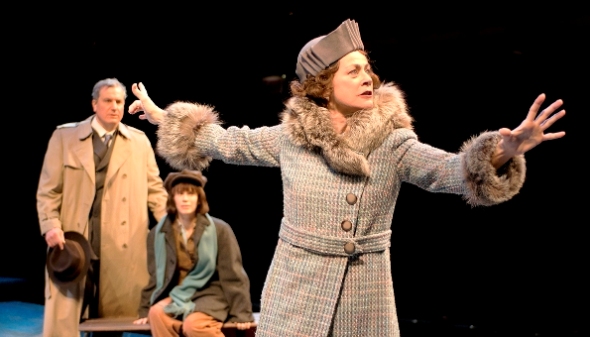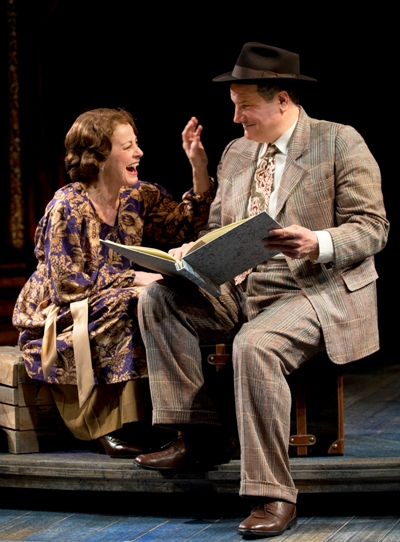‘Gypsy’ at Chicago Shakespeare: This Rose puts fresh blush on Sondheim’s star-gazer
“Gypsy,” by Arthur Laurents, Jule Styne and Stephen Sondheim, directed by Gary Griffin at the Chicago Shakespeare Theater through March 23. ★★★★★
By Nancy Malitz
Chicago Shakespeare Theater has given us a “Gypsy” for our own time, one that embraces the difference that 55 years have made since the brassy blockbuster first strutted onto the stage. As directed by Gary Griffin, it’s a gritty roadshow musical with a surprisingly contemporary and tender heart.
Its star is Momma Rose, and when you consider that this stage mother has been played by names so famous that all you need to say is Ethel or Angela or Rosalind or Bette or Patti or Bernadette, all with outsize personalities of their own, you can appreciate the wisdom of Griffin choosing the remarkable Canadian actress and chanteuse Louise Pitre (at right) to give us a Rose free of expectation.
Pitre is, in her real-life maturity, a striking beauty, but you’d never know it. Onstage she creates a wonderfully ordinary, smallish looking woman and it’s her voice that gets your notice at the onset. It seems to well up from deep inside her, edged with velvet or gravel or whatever else it takes in furtherance of some great need. Hers is a superb vocal instrument with a darkly insinuating, actor-friendly palette. You sense that Pitre could channel Piaf and Billie with the best of them.
Rose’s against-the-odds belief in herself and the vaudeville potential of her daughters is so feisty it’s endearing. Or so it first seems. Momma defies corrupt Uncle Jocko (Marc Grapey, hilarious in a cameo) and other show-biz cynics to get results for her juvenile troupers, and she plies her charms with genuinely nice guy Herbie, who has connections. Keith Kupferer plays him, clearly smitten, to perfection. Herbie willingly lets her sink her hooks in; why shouldn’t we?
As the tension builds, it helps that the audience nearly surrounds Rose and her brood. The thrust floor at Chicago Shakespeare might seem at odds with the very nature of this mid-century showbiz classic, but in fact it makes it easier to identify with the intimate aspects of the story. Momma is in the same room with us as she demonstrates her galvanizing hustle and support, and also her petty thefts, the knee-jerk lies and those fierce bursts of anger that erupt like steam.
We’re not protected by a traditional proscenium, to which designer Kevin Depinet, with his melted arch, wryly refers, and that’s all to the good as the situation threatens to blow. Meanwhile, the CST’s excellent 14-piece acoustic orchestra, ramped up with extra horns and plucky strings, is promoted from the traditional obscurity of the pit to a lofty perch, and that’s a good thing, too.
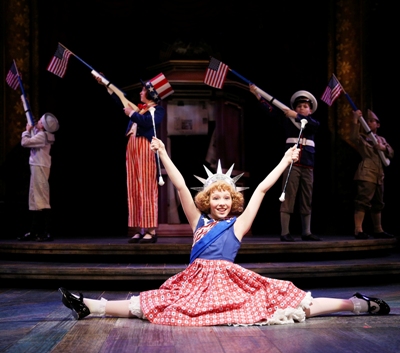 Rose doesn’t understand the ghastly mistakes she makes with Baby June, on whom she has pinned her hopes, or with Louise, for whom she settles and then betrays. But Pitre allows us to know the why. This fine actor’s revelations of character may lack Gypsy’s breathtaking way with a shoulder strap, but they are just as deftly dropped.
Rose doesn’t understand the ghastly mistakes she makes with Baby June, on whom she has pinned her hopes, or with Louise, for whom she settles and then betrays. But Pitre allows us to know the why. This fine actor’s revelations of character may lack Gypsy’s breathtaking way with a shoulder strap, but they are just as deftly dropped.
The result is a riveting story. Today’s “Gypsy” audience is unlikely to be as titillated as they were in 1959 by the idea of a thrice-married single mom whose notion of providing for her daughters is to keep the dream of stardom alive by throwing in with an agent “uncle” for a hard life on the road. Yet this production still shocks the senses, and not just because of the fateful strip-tease.
Momma Rose’s self-delusion, which is complex, ennobling and disastrous, touches our contemporary sensibilities because of a dozen subtle shifts in emphasis that, as it turns out, the librettist Stephen Sondheim left room for. As a young lyricist who went to work on “Gypsy” with book writer Arthur Laurents and composer Jule Styne, Sondheim said he came to understand the actor’s need to find his or her own way into a song. There is value, he later wrote, in what is unsaid, provided the song has something worth unsaying. Indeed, the greatest lyrics do offer that room for interpretive insight — in the underlying music and in the performer’s art, or what’s a cover for?
 Griffin has found similar room for exploration at the level of the musical itself. The familiar seems fresh when you start to consider why Rose, just hours before she’s to wed for the fourth time, suddenly pushes her daughter Louise into a striptease. Or whether Rose, as the divorced mother of two young girls, asked her father for money expecting a yes. Or if “Baby June” actually had talent. Or who props whom up when Rose starts to sing “Wherever we go, whatever we do, we’re gonna go through it together,” with Louise and Herbie joining the chorus.
Griffin has found similar room for exploration at the level of the musical itself. The familiar seems fresh when you start to consider why Rose, just hours before she’s to wed for the fourth time, suddenly pushes her daughter Louise into a striptease. Or whether Rose, as the divorced mother of two young girls, asked her father for money expecting a yes. Or if “Baby June” actually had talent. Or who props whom up when Rose starts to sing “Wherever we go, whatever we do, we’re gonna go through it together,” with Louise and Herbie joining the chorus.
The slant you get on the story starts with the questions you ask. Griffin has given us a fragile family, but also a real one, that is coming apart. “If Momma was Married,” sung by June and Louise (Erin Burniston and Jessica Rush) toward the end of the first act, has you aching for them all.
(Griffin’s apt touch with “Gypsy” holds promise for Sondheim’s “Road Show,” which opens at CST’s upstairs theater in March. The Mizner brothers, tycoons of the boom and bust Twenties, had intrigued Sondheim as an idea since the ‘50s. But in contrast to “Gypsy,” which went from page to stage in four months, Sondheim’s other road show musical saw its first incarnation in the ‘90s and endured what he called a “tortuous evolution” of 14 years without becoming a hit.)
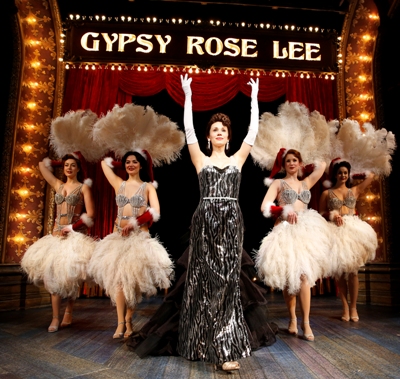 CST’s “Gypsy” is smartly cast. Rose’s late-blooming “other” daughter, Louise, who at 19 is still wearing trousers when Rose orders her to shed them for stripper’s silk, is brought to exquisite life by Rush. Louise’s birthday song, sung to a new pet lamb, has one of the best punch lines there is to mark the beginning of the end of innocence – “I wonder how old I am” – and Rush won a big round of applause with it. By gradual degrees wiser and sadder, her Louise has become a forthright counter-measure to her mother’s erratic ways by the time they’re booked into the wrong kind of theater in the wrong part of town. But she’s still her mother’s daughter, and the transformation of the family’s kids-show ditty “Let Me Entertain You” into the come-on that sets Louise free of Momma’s grasp shows no small cunning in the playing of it.
CST’s “Gypsy” is smartly cast. Rose’s late-blooming “other” daughter, Louise, who at 19 is still wearing trousers when Rose orders her to shed them for stripper’s silk, is brought to exquisite life by Rush. Louise’s birthday song, sung to a new pet lamb, has one of the best punch lines there is to mark the beginning of the end of innocence – “I wonder how old I am” – and Rush won a big round of applause with it. By gradual degrees wiser and sadder, her Louise has become a forthright counter-measure to her mother’s erratic ways by the time they’re booked into the wrong kind of theater in the wrong part of town. But she’s still her mother’s daughter, and the transformation of the family’s kids-show ditty “Let Me Entertain You” into the come-on that sets Louise free of Momma’s grasp shows no small cunning in the playing of it.
There’s a nice surprise in Griffin’s handling of the kids’ audition before T.T. Grantzinger, which they envision as their ticket to the Orpheum Circuit at last. The routine is old and dreadful, of course, but we see that the kids have grown into professionals. When Burniston’s babied June, who’s now a young adult, gets a moment for a dramatic reunion with her beloved cow, she actually utters a few lines that tug at the heart. (Bravo to Burniston for accomplishing this in the middle of so much ridiculousness.) There are few who would defend Momma Rose at the end of “Gypsy,’ and June definitely would not. But you can tell this stage director knows there was some good in Momma’s relentless pushing.
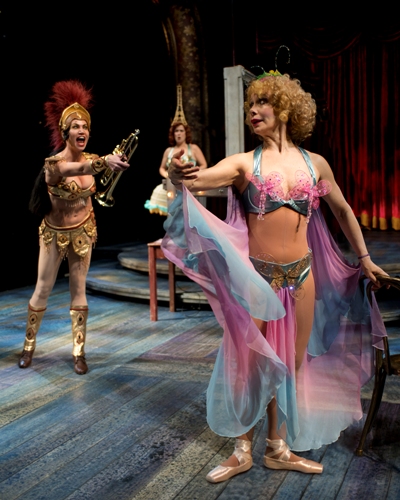 Tessie Tura (Barbara E. Robertson) gets credit for the valuable object lesson that Louise is given about the fine art of burlesque. As Tessie, an uproarious former ballerina, joins two other veterans with backstage time to kill, she explains, “If you wanna grind it, Wait till you’ve refined it,” and it’s the tip that Louise will first and best remember when her time comes. But there is also little doubt that “bump it with a trumpet” Mazeppa (Molly Callinan) and “twinkle while you shake it” Electra (Rengin Altay) will be found inspirational eventually.
Tessie Tura (Barbara E. Robertson) gets credit for the valuable object lesson that Louise is given about the fine art of burlesque. As Tessie, an uproarious former ballerina, joins two other veterans with backstage time to kill, she explains, “If you wanna grind it, Wait till you’ve refined it,” and it’s the tip that Louise will first and best remember when her time comes. But there is also little doubt that “bump it with a trumpet” Mazeppa (Molly Callinan) and “twinkle while you shake it” Electra (Rengin Altay) will be found inspirational eventually.
Charismatic Tulsa, who catches Louise’s eye as the budding choreographer of their teenage troupe, is played with on-the-cusp cool by Rhett Guter, who also had an eye-catching turn in Sondheim’s “Follies” at CST. Guter’s soaring dance scene with Rush, in which Tulsa envisions escape with June even as Louise is overwhelmed by love in his arms, is the stunning setup for heartbreak. (The dance numbers, choreographed by Mitzi Hamilton, hit precise emotional targets throughout.)
The young girls who play Baby June and Young Louise, along with their assorted talent show contestants, were very good indeed. (Costume designer Virgil C. Johnson has a way with balloons, but it would be unfair to stop there. From Uncle Jocko’s blinding plaid and Herbie’s rumpled comfort to Gypsy’s peachy boudoir chiffon, his choices were spot-on, and that goes for Melissa Veal’s wigs, too.)
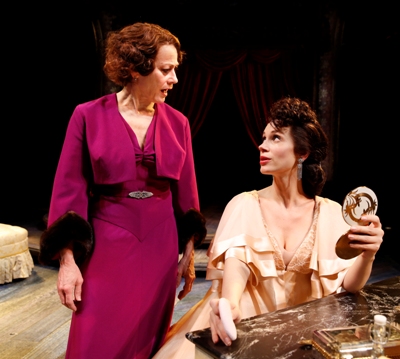 But the beginning and the end of “Gypsy” is Rose. After the famous Gypsy Rose Lee throws Momma out of her posh dressing room, the angry Rose gets the last big scene – one of the best in Broadway’s history — as she takes charge of Gypsy’s empty stage. It’s a famously climactic crack-up, “Rose’s Turn,” and Pitre gives it extraordinary range and subtlety as she builds to a hallucinatory rant on what she views as the betrayals and bad luck that robbed her of her own chances. Her ungrateful girls (“thanks a lot and out with the garbage”) get the brunt of it, but as she sobs for this lost Momma, it’s clear there’s an even longer history of abandonment and heartbreak that has left Rose upside down in her American dream.
But the beginning and the end of “Gypsy” is Rose. After the famous Gypsy Rose Lee throws Momma out of her posh dressing room, the angry Rose gets the last big scene – one of the best in Broadway’s history — as she takes charge of Gypsy’s empty stage. It’s a famously climactic crack-up, “Rose’s Turn,” and Pitre gives it extraordinary range and subtlety as she builds to a hallucinatory rant on what she views as the betrayals and bad luck that robbed her of her own chances. Her ungrateful girls (“thanks a lot and out with the garbage”) get the brunt of it, but as she sobs for this lost Momma, it’s clear there’s an even longer history of abandonment and heartbreak that has left Rose upside down in her American dream.
Still, as Pitre plays it, Who knows? This Rose seems to be listening to herself, as it turns out Gypsy was. Perhaps the spewing has done her some good.
Related Links:
- Performance location, dates and times: Go to TheatreinChicago.com
- Jocko: Where have you seen this actor before?
- Herbie: Where have you seen this actor before?
- Upcoming: Director Gary Griffin directs Sondheim’s “Road Show” next
- Sondheim’s “Follies” at CST: Broadway glitz and glamour, with all the endearing bruises
- Sondheim’s “Sunday in the Park with George”: Chicago Shakespeare connects all the dots
- Sondheim’s “Into the Woods” at The Hypocrites: Something special blooms from almost nothing
Tags: Arthur Laurents, Barbara E. Robertson, Chicago Shakespeare Theater, DErin Burniston, Gary Griffin, Gypsy, Gypsy Rose Lee, Jessica Rush, Jule Styne, Keith Kupferer, Kevin Depinet, Louise Pitre, Marc Grapey, Melissa Veal, Mitzi Hamilton, Molly Callinan, Rengin Altay, Rhett Guter, Road Show, Stephen Sondheim, Virgil C. Johnson

